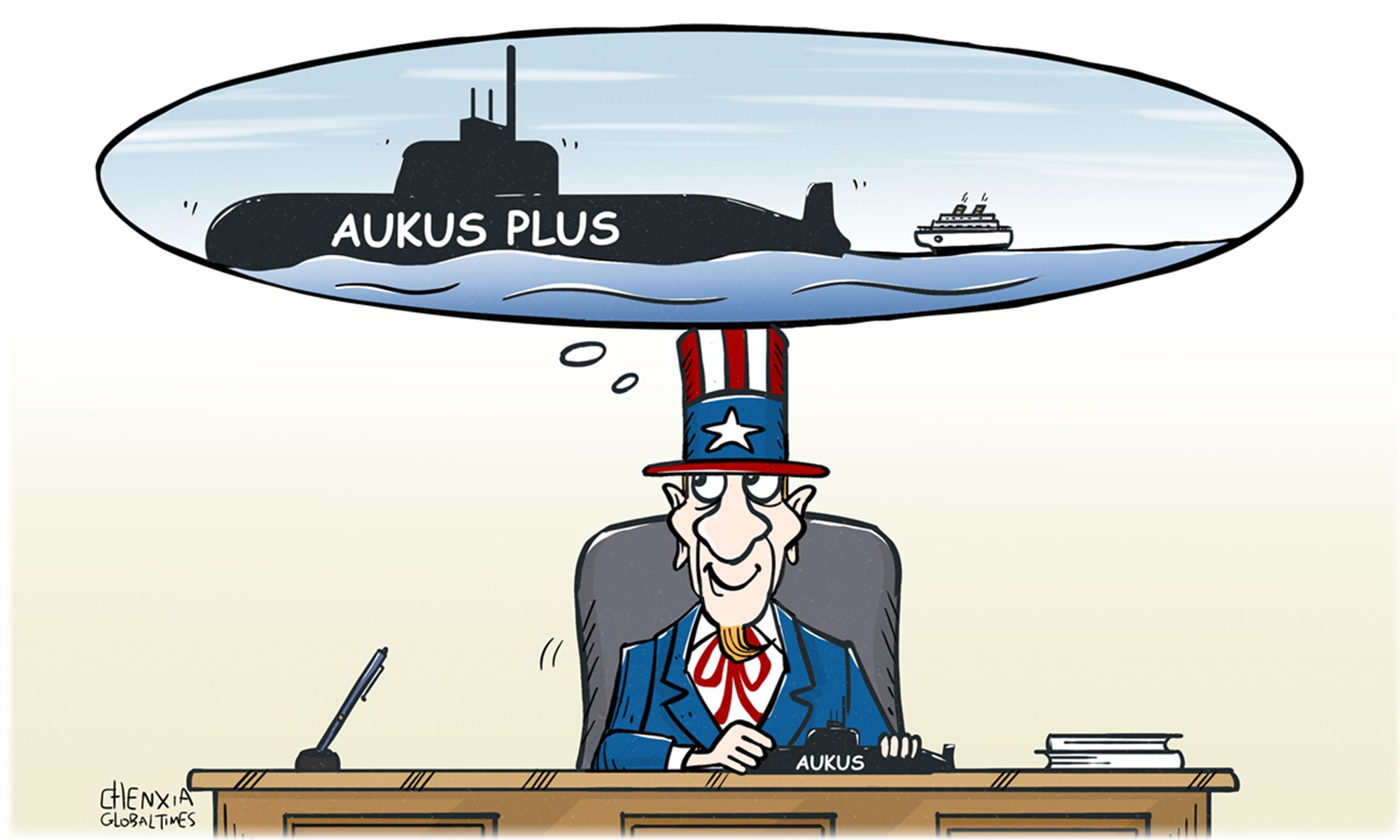
Illustration: Chen Xia/GT
In order to maintain its hegemony in the Asia-Pacific region, the US is urgently pushing for the expansion of pillar two of AUKUS. However, whether it is Canada or Japan, they will ultimately only become sacrifices for the US to expand its military presence in the region and defend its own hegemony.According to Politico, the US, UK and Australia are rushing to expand their trilateral AUKUS defense partnership to further allied nations before potentially tumultuous elections in all three countries over the next 14 months. Japan and Canada are in line to join the so-called pillar 2 section of the AUKUS agreement, which will see participants sign up to extensive military technology collaboration, by the end of 2024 or early 2025, one senior diplomat involved in the talks told Politico.
Da Zhigang, a researcher at the Institute of Northeast Asian Studies at Heilongjiang Provincial Academy of Social Sciences and the chief expert of the Northeast Asia Strategic Research Institute, told the Global Times that in order to achieve its strategic goal of countering China, the US needs to integrate more allies into AUKUS. Therefore, it is predictable that the US will promote staunch allies like Canada and Japan to join pillar two.
In the current situation, both countries have their own calculations for potentially joining AUKUS. Canada may believe that this move could change its marginalization in the US' Indo-Pacific Strategy to some extent. However, the disadvantages of doing so are definitely greater than the benefits the country wants to obtain.
If Canada joins AUKUS, it will inevitably be more involved in security issues in the Asia-Pacific region, coupled with the Taiwan question and South China Sea issue that it has already begun to interfere with, this will further strain China-Canada relations, and deterioration will be anticipated in the short term.
As for Japan, the country has been making efforts to seek further breakthroughs in its military restrictions for a long time. It has shown great interest in joining AUKUS. Da believes that if this becomes true, it may deepen cooperation between the US and Japan in military equipment and enable Tokyo to break through its pacifist Constitution and the Three Principles on Transfer of Defense Equipment and Technology.
Strengthening cooperation with Japan through AUKUS and helping Japan make such breakthroughs is a foolish policy that will bring bigger disasters to Asia. Australia was once a victim of Japanese militarism, so it is ridiculous that AUKUS, a security agreement that Australia does not need due to its geographic advantages, is now being used by Japan as a springboard to revive Japanese militarism.
AUKUS doesn't progress smoothly. Australia faces many difficulties in advancing this time-consuming and costly project, with many Australian people expressing their opposition strongly. The efforts to attract more countries to join AUKUS aim to prolong the life of the faltering pact. However, the project has a high degree of uncertainty and may ultimately come to nothing. Especially with the uncertainty that the upcoming US election adds to the future of US-Australia relations, some Australian media outlets and scholars have even suggested that the return of Donald Trump could put AUKUS on hold. Under such circumstances, the Biden administration's current strong push for AUKUS expansion is purely for its own benefit.
When AUKUS was formed, the US' intention was never to "promote a free and open Indo-Pacific that is secure and stable" by deploying nuclear-powered submarines through Australia. Instead, it is about creating a comprehensive military-security alliance in the Indo-Pacific Strategy to contain the rise of emerging powers in the region and maintain its hegemonic position in the Indo-Pacific region.
Some insightful Australians have already realized that Australia is surrendering its sovereignty to the US. Former Australian prime minister Paul Keating recently criticized the AUKUS deal as the "worst international decision." Hopefully, such words can sound the alarm for countries that are interested in joining AUKUS, be it whichever pillar.


